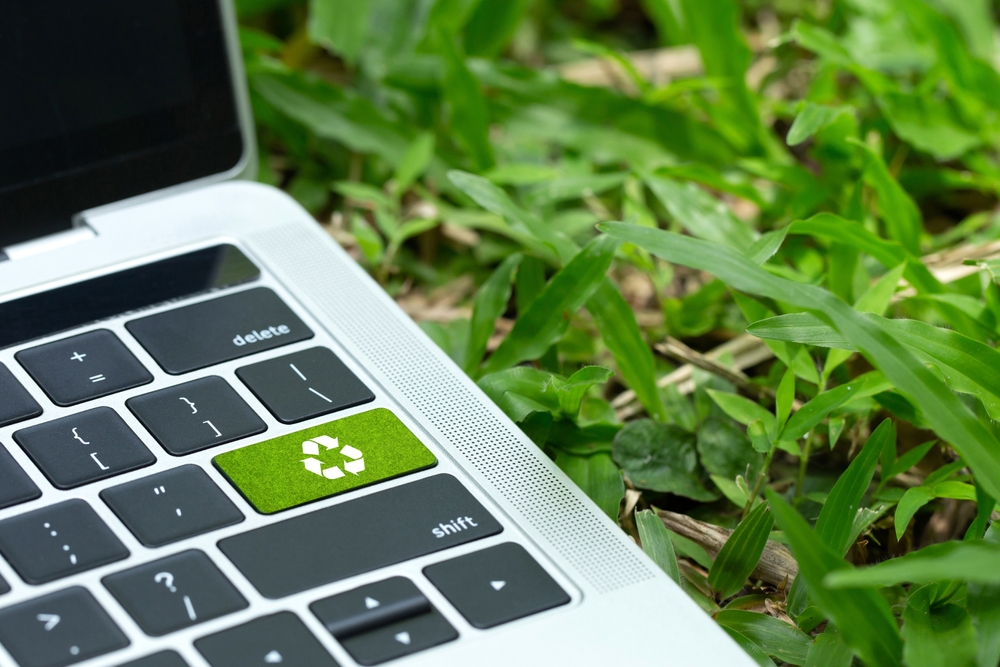
Refurbished and Remanufactured PCs: A Strategic Move for MPS Providers?
February 11, 2025
Sustainability, Managed IT, Article, Trends
Offering refurbished and remanufactured devices presents a significant strategic and profitable opportunity for Managed Print Service (MPS) providers. By incorporating these cost-effective and sustainable options into their portfolio, MPS providers can unlock several key advantages. Tapping into new customer segments, particularly budget-conscious businesses and organisations prioritising sustainability, becomes possible, diversifying the customer base and reducing reliance on traditional print services. The upcoming end of Windows 10 support presents a timely opportunity, as many businesses will need to upgrade or replace existing hardware, creating a need to adopt responsible e-waste recycling programmes.
Giving old tech new life in the circular economy
Circularity is a core principle that fuels the growth and importance of refurbishment and remanufacturing in the tech industry. The circular economy aims to keep products and materials in use for as long as possible. Through refurbishment and remanufacturing, devices are given a second life, reducing the amount of electronic waste generated and conserving resources associated with manufacturing new devices.
Advancements in refurbishment and remanufacturing processes have led to significant improvements in the quality and performance of refurbished devices, making them virtually indistinguishable from new models. The growing supply of refurbished and remanufactured PCs, driven by hardware becoming available from typically large organisations that operate on fixed timescale hardware refresh cycles, is also contributing to their increased popularity, as these organisations look for secure end-of-life services that avoid old devices going to landfill.
Although refurbished/remanufactured PCs/laptops will not always be a viable choice – for example, such devices will not, for the time being, have the AI-embedded capabilities of the latest systems, and will not suit those requiring extreme performance, such as video editors and graphic designers – they are likely to meet the needs of a large proportion of an organisation’s user base.
Regulatory landscape supports circularity
Governments key influencers driving this change. The EU has introduced a consumer regulation around the right to repair. This Directive, while focused on consumer goods, is likely to further drive awareness of the need for better management of resources and fuel demand for such capabilities within the workplace. The Directive states that consumers must be able to request the fixing of a device (at a cost), rather than accepting a replacement or having to make a new purchase, even after the device has fallen out of warranty.
The EU also has the long-established Waste Electrical and Electronic Equipment (WEEE) Directive, which states that any item of electrical equipment must be taken back by the reseller or other body from a user for recycling/remanufacturing or effective end-of-life disposal.
France has introduced Decree no. 2024-134, which is setting legal targets for the reduction in use of resources in areas such as single-use plastics (SUP) and other packaging. Again, although this is aimed at consumers, part of the Decree is aimed at creating better informed consumers – who are likely to start to demanding change within the workplace. It has followed this with a new Decree mandating that 20% of IT devices bought by organisations need to be refurbished, with a target of 40% by 2040. The legislation is even more stringent in the public sector, targeting an increase of up to 50% by 2025.
Other governments have also introduced laws around the need to procure IT equipment in a sustainable manner.
There is also a standard around sustainable procurement – ISO 20400:2017.
Remanufactured or Refurbished?
While the terms are often used interchangeably, there are some important differences between refurbished and remanufactured PCs. Refurbished PCs generally are restored to working condition with a limited warranty, while remanufactured equipment uses a more comprehensive process aimed at bringing a used device as close as possible to its original factory condition.
One example is HP’s Renew Solutions business, which offers refurbished HP products that have been returned to HP for a variety of reasons and then put through a rigorous refurbishing and testing process to bring them back to excellent condition and performance.
Crucially, all HP Renew Solutions products come with an HP warranty, as they undergo similar building and testing processes to new products. The inventory primarily comes from excess factory stock or discontinued products.
HP Renew Solutions is available across EMEA through selected resellers and extends beyond PCs to include workstations, displays, mobility solutions, accessories, and retail POS systems.
There are several independent providers offering remanufactured devices. One example is Circular Computing, which offers carbon neutral remanufactured HP, Dell and Lenovo laptops and reports it delivers up to 40% cost savings compared to brand new models, as well as significant sustainability benefits. Its core remanufactured laptop models combine premium-grade quality and performance with sustainable carbon-neutral IT for an unrivalled user experience.
The company has been awarded a significant contract worth up to €30M with Ireland’s Department of Public Expenditure, National Development Plan Delivery and Reform. This agreement, facilitated through the Office of Government Procurement, will see Circular Computing supply remanufactured notebooks to the Irish public sector over the next four years. The contract holds the potential for around 15,000 notebooks to be provided annually, supporting Ireland’s Environmental, Social, and Governance (ESG) goals.
Operating from its remanufacturing facility, Circular Computing has the world’s first and only BSI Kitemark for both remanufactured and refurbished laptops. The BSI Kitemark for remanufactured laptops certifies that its products are ‘equal to or better than new’ as required by the BS standard BS8887-220 and BS8887-211. It also holds several ISO accreditations, as well as a Cyber Essentials certificate for security capabilities.
Another example is Flex IT, a Dutch IT lifecycle management company. While it deals in a wide range of refurbished/remanufactured IT equipment, including servers, storage, network equipment, AV equipment, print devices, and tablets/mobile phones, it has a thriving pan-European business in the provision of refurbished/remanufactured PCs and laptops. It has gained R2V3 (Responsible Recycling v3) certification – a standard for the responsible reuse and recycling of IT hardware, components, and materials.
The opportunities for MPS providers
There is growing availability of refurbished and remanufactured printers amid increased focus from manufacturers, which we will explore in a later article. From the PC perspective, offering refurbished devices as part of a Managed IT solution offers several opportunities for MPS providers
- Sustainability: Reselling refurbished and remanufactured devices works for both providers and customers in aligning with sustainability initiatives and helping reduce electronic waste. For the provider, it can enhance their reputation and attract environmentally conscious customers.
- Complementary product offerings: Refurbished and remanufactured devices can complement other IT services offered by MPS providers, such as managed desktop services (physical and virtual), device-as-a-service (DaaS), or other managed IT services, such as security.
- Additional revenue stream: Reselling refurbished and remanufactured devices can provide a new revenue stream for MPS providers, helping to diversify their business and reduce reliance on print.
- Opportunities for consultancy: Ensuring a customer gets the right mix of devices, that they are implemented and managed correctly, and that effective and secure end-of-life services are provided may require consultancy to be provided to ensure that any plan is realistic.
- Increased profitability: Selling new devices does not provide much margin to the reseller. Remanufactured and refurbished devices generally come with a higher profit margin. As such, an MPS provider should be able to strike a deal with a good device provider to gain good margins on any sales.
Strategies for Success
- Source quality devices: Partner with reputable refurbishers and remanufacturers to ensure the quality and reliability of the devices you sell. Ensure that spares are held in stock and that rapid fix or replacement of the device is available to customers.
- Combine with similar refurbished and remanufactured print device provision. A focus on refurbished and remanufactured PCs and laptops will seem incongruous if the customer can only source brand new print devices from you. Ensure that the option for an overall coherent refurbished/remanufactured hardware provision service is available.
- Offer comprehensive support: Provide the same level of support for refurbished and remanufactured devices as you do for new equipment, including warranties and technical assistance.
- Focus on security. Older devices, as well as no longer gaining security patches from Microsoft if running Windows 10, may also not have device driver and other updates to provide sufficient security for an organisation. Ensuring that refurbished or remanufactured devices meet modern security requirements should be a major part of any sales messaging.
- Promote sustainability: Highlight the environmental benefits of buying refurbished and remanufactured devices to attract eco-conscious customers. Component and material reuse, the avoidance of landfill, negation of the need to mine and refine rare earth and other metals, and so on can be turned into powerful messages.
- Bundle with other services: Offer bundled packages that include refurbished or remanufactured devices with other IT services, such as managed desktop services or cybersecurity solutions.
- Also look to remote desktop services. For some users in organisations, providing remote access to a modern desktop via an older PC is a viable option. Providing sandboxed, secure access to remote desktop services in the cloud can be a way of extending the life of existing devices in the organisation’s environment, and enabling a cascade approach to managing the life of devices. This then also opens up opportunities for consultancy services around how best to implement such an approach and manage it in the right manner.
By strategically incorporating refurbished and remanufactured devices into their offerings, MPS providers can expand their market reach and contribute to a more sustainable technology landscape.
Conclusion
Managed print service (MPS) providers seeking new revenue streams or expansion opportunities to maintain market competitiveness should consider offering refurbished and remanufactured PCs. However, Quocirca advises against pursuing this avenue independently. Instead, the most effective approach, as with many expansion strategies, lies in establishing strategic partnerships with established and successful providers in the refurbished/remanufactured device market. This collaborative approach allows MPS providers to leverage existing expertise and infrastructure, minimising risk and maximising potential returns.
Read more sustainability insights on Quocirca’s Sustainability Hub




